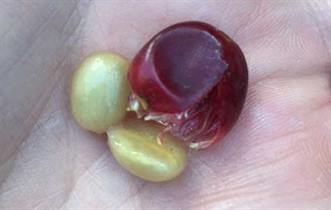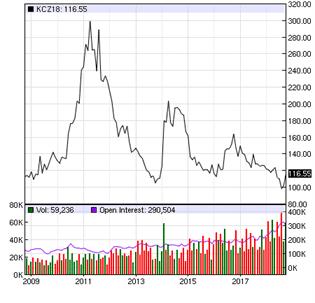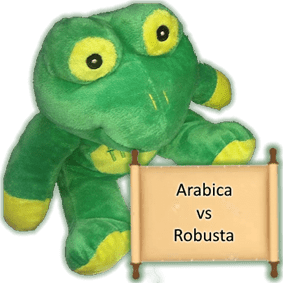Intro
Yip, its bean a while. In this newsletter we educate, pontificate and recreate. Well, at least we plan to. Time to read: about 7 minutes.

Coffee is a Seed
It seems that having a little information on coffee in each newsletter is popular. So this time let’s look at your standard coffee bean.
When does it become a bean? Essentially it is a seed. Coffee growers pick the fruit and before it gets to us the seed is removed from the fruit, either by them, a co-operative or someone they sell the cherry to who either processes it themselves, or sells them to someone that does.
By the time we as roasters roast the seed, that is extracted from the fruit, it is called a bean not a seed.
Looking at the fruit itself, we see that Coffea is a complex fruit with many layers. It is one of the oldest fruits too, since it produces no fructose (something fruits developed later).
| Coffea layers | Typical Fruit layers |
|---|---|
|
|
The main difference is that we consume the seed + embryo in coffee. Silver skin is only removed once roasted and comes off the seed when the bean goes through heat and expansion.
Since it is a seed, what is important is that when we as roasters get it, it should have its cell structure intact. That means it should still technically be viable, even if its moisture level is typically on 10% by then.
How the seed/bean is removed from the cherry is vital. If the process retains the cell structure, then it means a higher quality cup of coffee. If processing is rushed, or the bean is subjected to temperatures about 36°C, then cell structure is damaged, and the quality of the final coffee suffers.

Commentary on C-market
We re-posted a commentary on the current low-price coffee commodity market price and how it negatively affects the coffee industry. Since then a number of other coffee people have come out beating their drum.
We want to reiterate the concern that coffee sold on the c-market price is only sustainable for large producers like those found in Brazil and Vietnam. These two countries alone produce 59% of the world’s coffee. Also, worth taking into account is the fact that c-market is traded in dollars, so a strong dollar normal results in a weak c-market.
Wow – hold on here, you say, WTF is the c-market? The c-market is the traded price of the future contract price of coffee. What that means is that traders (most have never seen a coffee farm) trade on the market for profit. The futures market is listed and traded on the stock exchange. The Arabica futures is traded on the NYSE and the Robusta c-market is traded on the LSE. Anyone can trade the market, there are even South Africans that trade this market.
Distilled: the c-market price is normally the price coffee contracts are secured at by the exporter or final processor of the coffee, when quality is not considered.
With Brazil and Vietnam (whose main crop is designed for instant coffee and low-cost blending coffee) being dominant, the c-market prices are so low. Another issue is the larger coffee companies buying up all the competition (between Nestlé, Mondelez and JAB Holdings they control over 40% of the purchasing of coffee). The result: corporate profits take priority. In fact, the only large purchaser of quality-driven coffee is Starbucks who purchase less than 2% of the world’s coffee.
The whole point is that at the current prices the coffee market is heading for a disaster. You as a coffee lover have a choice, and it should be to support those purchasing quality or adding value to the market.
While we at Quaffee are more interested in paying for quality and this tends to remove the c-market price from negotiations, it still affects the market, and specifically the coffees we love, and love to offer to all. You can read more about this in the section on how we categorize coffees…
Tip the farmer
We have a lot of respect for those in the industry that have clear visions. We have been working with a subsidiary of one of these companies Bespoke (a subsidiary of Bean There). In fact we sourced the popular Musema through them and currently, we get our Kochere and Gatanga via this partnership.
Recently they have started an initiative that we would like to promote. Are you keen to tip a few farmers? Well you can do so here: https://www.thundafund.com/project/tipthefarmerburundi – donate whatever you feel is fair.
It is a great initiative and even if we do not run a coffee shop we are keen to support the concept. Let’s help them meet their goal of hiring an agronomist for a year.
You can read more about the Bean There side here: https://tipthefarmer.org.za.
Participation in Roasting Comp
Since we are not a Café, we are often excluded from many of the industry events. However recently we were invited to join 9 other South African roasters (others were invited but did not participate) in an attempt to roast a Nicaraguan honey coffee, none of us had ever seen.
We decided to go for a more omni-roast style roast (one that is more generic), which ended up being a blend of the profile we liked and a profile that was a little darker. We took a chance submitting coffee that was 2 days from roast, since cupping was the protocol. In the end, we came joint third with Urban Express.
We had fun participating, and it was good to chat about roasting approaches. The International judging panel gave positive feedback on the roasting quality in South Africa and was amazed at the totally different flavours each roast was able to extract from the coffee.
This was the first time a competition like this had been held in South Africa. We look forward to learning from this experience and hopefully we will be invited to compete again.
New secret coffees
While we still have a little of the Iyela and will be announcing its roast soon, we have 3 secret coffees coming. Some may push peoples budgets. What you are not a subscriber to the secret offering yet? Subscribe here: …
New coffees
A shortlist of coffees to look out for:
- Guatamalan Palo Blanco will be replacing the Antigua Pulcal this week.
- A new Brazilian is coming mid-November. We are excited about this coffee.
- The latest crop of Limu is coming, and it is very different from the Konjo.
- A new Ecuadorian coffee may make its presence before the end of the year.
Things you may have missed
We post a lot of coffee things via our social media feeds. Some are just fun but some are interesting if you are, like us, a little geeky about coffee.
- The set that won worlds is really worth watching: World Barista Championship 2018 – Final Round – Agnieszka Rojewska.
- Ric Rhinehart | The Future for Specialty Coffee: https://youtu.be/DTiSE3NQoRI.
- A great video on espresso by Tim Wendelbow: https://youtu.be/vmlLkD1RzsY.
- Very good panel discussion: https://youtu.be/O2Bl3uO_0HA.
- Very interesting series on Quality:
-
- Cheese Expert: – https://youtu.be/myXB74CONsE.
- Choc Expert: – https://youtu.be/JZ2fRE_nkak.
- And Coffee Expert: – https://youtu.be/liGwcuFyaNY.
- Cool video shot by Keagan when visiting the roastery: – https://youtu.be/67dC8bGB8e0.


